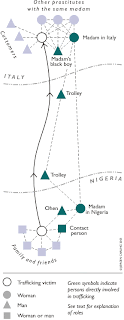DeltaWomen: IT’S LUCRATIVE...AND SO IT THRIVES:
Human trafficking has become innovative over the years. With classified advertising websites like Backpage.com, traffickers were afforded a channel to peddle their “commodities” in the safety of their hideouts while their victims stayed locked in a hotel helplessly waiting for their customer, and the next, and the next, and the next. So it’s no wonder that Backpage.com earns more than $22 million annually from prostitution ads in the United States, as reported by AIM Group, a media research and consulting company.
You can imagine my shock as I went through several articles on human trafficking and read a 2008 article about “baby farms” or “factories” in Nigeria where babies were “bred” to be eventually sold.
Teenagers with unwanted pregnancies were reportedly lured in illegal or unregistered maternity clinics or hospitals then locked up until they gave birth. They were then forced to give up their babies for a fee of around 20 000 naira ($170). Some were raped while detained there. There were some who had been staying there for years and allowed themselves to be impregnated to later sell their babies. Dire poverty and need to survive pushed some of these girls to be “breeders.” The babies were sold to buyers from 300 000 and 450 000 naira ($2 500 and $3 800) each. Some were sold to legitimate couples who wanted children. Other babies weren’t as lucky. They were sold as offering in rituals to later be killed.
In the U.S. State Dept Trafficking in Persons Report in 2009, Nigeria was described as a “source, transit, and destination country for women and children trafficked for the purposes of forced labour and commercial sexual exploitation.” Like other countries where poverty is prevalent, Nigerians were trafficked to destinations outside Africa like Italy, Belgium, Spain, the Netherlands, Germany and the United Kingdom (recent news from a high ranking British government official acknowledged the growing problem on human trafficking in the U.K.).It was reported that an increasing number of young girls claiming asylum in the United Kingdom were trafficked. The UNICEF estimated between 50,000 and 70,000 African females trafficked to Italy for prostitution, of whom 70 percent were from Nigeria.
It’s amazing that thousands of these trafficked children reach other countries as unaccompanied minors. I wonder what the immigration people ask the unaccompanied minors or the adults meeting them before they were allowed entry into the country. The children probably didn’t even speak the country’s local language.
Trafficking has been so organized over the years that criminals can systematically recruit people, often involving relatives or persons already known to the victims. Traffickers resort to deceit with promises of education, training, and pay, only to have all these promises taken away once the victims leave their families.
As I continued to go through more articles, the answers to the common causes of trafficking are all too familiar - victim of war, poverty, gender inequality, lack of information, high demand for cheap labour, or lack of opportunities where they live.
The victims are clearly denied their basic human rights and become exposed to serious health hazards because of the sex trade they are trapped in. They risk getting inflicted with infectious diseases, tortured into submission, drug and alcohol addictions, depression and other mental health problems as a result of their traumatic experience. And because some have an illegal status, reported cases and convictions of traffickers either do not prosper, or never get reported at all.
However, the growing international awareness that human trafficking is a global problem crossing borders has moved governments, non-governmental organizations (NGOs) and the United Nations to take broader and tougher action against human trafficking.
Several agencies and NGOs in Nigeria related to anti-trafficking were organized to address the problem:
- The Coalition Against Trafficking in Women – International (CATW) which promotes women’s human rights by working internationally in the fight against sexual exploitation
- The National Council of Women Societies (NCWS)
- Women Trafficking and Child Labor Eradication Foundation (WOTCLEF)
- National Agency for the Prohibition of Trafficking in Persons (NAPTIP), a 585-employee agency nationwide with 109 investigators and 27 prosecutors dedicated to anti-trafficking
- NPF, established in 2005, staffed 22 units in states with the worst trafficking problems
- The Nigerian Immigration Service (NIS) also has anti-trafficking units to monitor illegal entries
- National Plan of Action (NPA) on Trafficking In Persons, covers research, prevention, prosecution, and protection of victims through collaborative actions with government, law enforcement agencies, the legislature, and NGOs.
Much-needed collaboration across countries was recognized to combat the growing problem.
With this international collaboration among law enforcement agencies in place, there had been more successes in getting a clearer picture of the systematic mobilization of trafficked victims across borders. This aids the enforcement agencies in determining key locations of contact points where trafficked victims are “handed over” (The illustration below shows how human trafficking crosses some borders), and apprehending the culprits.
(Trafficking in Women from Nigeria to Europe)
In closing, it is a known fact that human trafficking is an old trade. It thrives because it’s a lucrative business for people who engage in it regardless of the mental, emotional and physical trauma inflicted on the victims. But with strict imposition of the law, collaborative cooperation of agencies and NGOs across borders, and as importantly, availability of programs to educate and make them self-sufficient enough not to want to venture or send children to unknown places, or programs to rehabilitate and reintegrate victims, we can make this world a better and more secure place to live in.
Sources:

No comments:
Post a Comment